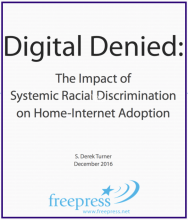Louisiana Net Neutrality Proponents Urge Senator Support
After the FCC chose to overturn federal network neutrality protections on December 14th, 2017, open Internet advocates and elected officials that favor network neutrality have sought avenues past the Commission to reinstate the policy. In Louisiana, four groups of citizens organized together to form Team Internet and stage Louisiana rallies in four cities in January. Their goal was to bring attention to the overwhelming opinion that network neutrality benefits Internet users and to convince Senator John Kennedy that he should vote to block the harmful FCC decision.
Fight for the Future (FFTF), Free Press Action Fund, and Demand Progress worked together to form Team Internet, which organized protests in Lafayette, Shreveport, Baton Rouge, and New Orleans at Kennedy’s offices. At the Lafayette office, a group of advocates led by Layne St. Julien presented petitions with more than 6,000 signatures to Kennedy’s deputy state director, Jay Vicknair. The petitions urged Sen. Kennedy to use his vote to overturn the FCC action.
According to Vicknair, constituents have called and emailed the office in numbers rivaled only by last year’s healthcare debates.
Advocate Tool, The CRA
Proponents of network neutrality — mostly people, companies, and entities that aren’t big ISPs — consider the FCC’s order harmful. In order to regain network neutrality protections, which would remove the threat of paid prioritization and better ensure an open exchange of ideas online, advocates hope to use the Congressional Review Act (CRA). Under the CRA, Congress can reverse the FCC decision within 60 legislative days of it being published in the Federal Register as long as there is a majority vote. At last count, 50 Senators had committed to supporting a reversal. Public Knowledge has created a quick video describing the process:
At the recent Team Internet protest, attendees called on Kennedy to “be a hero” and be the 51st.
In A Net Neutrality Zone



